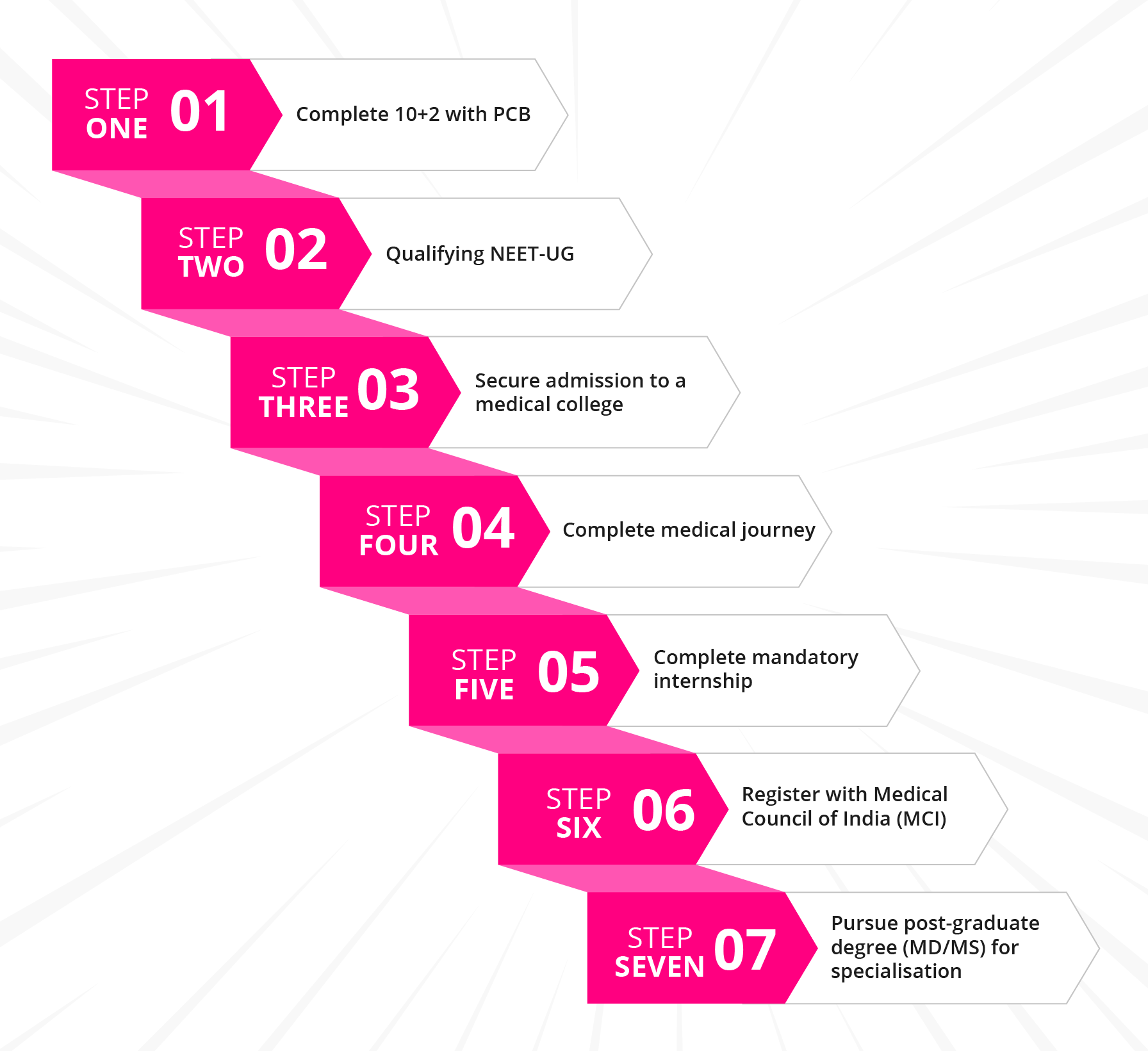Why Career Counselling Matters More than Ever for Today’s Students?
Why Take Career Counselling to Be a Doctor

The journey of becoming a doctor doesn’t start after clearing the NEET exam; it starts way earlier than that. If you are a student passionate about treating and helping humankind, then your right time to start planning to be a doctor is class 10th. You might think that it is too early for you, but no! As you are to decide the right stream after 10th, to ensure you get Science stream with Biology, it is important for you to maintain good grades. To help you know what the bare minimum are, requirements and what’s your journey to become a doctor, it is the career counselling experts who guide you at every step.
Today, in this blog, we are exploring why you should take career counselling to be a doctor and how they are helping you every step of the way. So, without further ado, let’s see your journey with them.
Step-by-step Journey to Be a Doctor
Before we shed light on how the career counselling experts help you throughout your journey to become a doctor, let’s see what your journey is going to look like. Refer to the following image to get clarity.

Now, let’s move forward to see how career counselling is crucial at every step of your journey to becoming a doctor.
How Does Career Counselling Help You Become a Doctor?
Becoming a doctor is no easy feat. From cracking the NEET UG exam to choosing the right medical college and eventually deciding your specialisation, every step demands clarity, focus, and resilience. The academic pressure can often feel overwhelming and that’s exactly where career counselling plays a crucial role. With expert guidance at every stage, career counselling ensures you stay on track, make informed decisions, and build the confidence needed to thrive in the medical field. Here’s how it helps you pursue your dream of becoming a doctor.
Stage 1: Stream Selection After 10th
You must know this very well that to become a doctor, you have to take the Science stream. However, many students with great percentile intend to take PCMB. When you know that to become a doctor, all you need is medical knowledge, it is better to take PCB and not to add the additional tension of Math as a subject.
To help you ensure you take the right subjects and select the right stream it is the career counselling experts helping you. Career counsellors with the help of a psychometric test help you understand your personality, strengths, and interests better. Taking career counselling after 10th gives you the clarity about your aptitude and abilities. This eventually helps in making long-term goals and brings clarity.
Stage 2: Clearing the NEET Exam
To clear the NEET UG exam, you need the right strategy and ample time to prepare for it. The journey of becoming a doctor starts the minute you enrol for PCB in class 11th. Hence, when you are aiming to be a doctor, you need to start preparing for your NEET exam. It is always better to start early than to start late and regret for life.
To clear the NEET UG exam, you need proper guidance too. This is where career counselling experts help you. When you take the psychometric exam, you will get to know what your academic weaknesses are. A sample NEET exam will give clarity about the sections you need to prepare better for. Instead of taking the pressure of clearing the NEET exam by preparing for everything altogether, the career counsellors help you make a foolproof plan to crack the NEET exam.
Stage 3: What’s Next After NEET Result
After the NEET results are declared, there are only a couple of possibilities or options further for you. The first is you cleared the NEET UG exam and secured a great rank. This will help you in getting into any top medical college in India. The second is you couldn’t get the dream rank and hence you plan to drop a year to practice better and secure your aimed rank next year. Or the third way out here is you secure a decent rank and decide to study MBBS abroad.
No matter what you decide, in every way, the career counselling experts are here to assist you. If you get selected in a top medical college, the counsellors will help you with the admission process. For your drop out year they will help you with the right preparation strategy. And at last, if you decide to study MBBS abroad, they offer affordable options.
Stage 4: Navigating Medical School
Choosing the right medical school is a vital step in your journey to becoming a doctor. It’s important to find an institution that not only matches your academic calibre but also offers the style of education that suits you best. Affordability is another key factor; your dream college should also align with your financial plan. This is where career counselling proves invaluable.
Expert counsellors help you assess each medical school by creating a personalised list of pros and cons based on your preferences, goals, and the offerings of each institution. While some colleges may boast world-class faculty and cutting-edge facilities, they might also come with a higher tuition fee. A career counsellor helps you strike the right balance, ensuring that your choice aligns with both your aspirations and your budget.
Moreover, counselling support extends to the application process itself. From guiding you on deadlines to helping with documentation and interview prep, they ensure you don’t miss out on any opportunity to turn your dream of becoming a doctor into reality.
Stage 5: Career Planning and Road Mapping
Career counselling isn’t just important until you gain admission into a medical school, it continues to be essential even after you’ve earned your degree. As you may know, completing your MBBS including a year of internship which qualifies you to practise as a doctor. But if you aspire to become a specialist or a surgeon, pursuing an MD or postgraduate medical degree is the next critical step.
Deciding which MD specialisation to pursue can be overwhelming. You need to consider multiple factors like earning potential, global career opportunities, work-life balance, and long-term stability. Instead of navigating this alone, it’s far more effective to consult with career counselling experts.
These professionals guide you through a personalised career roadmap. They help you shortlist specialisations that align with your strengths, interests, and long-term goals, ensuring you make informed decisions at every stage of your medical journey.
MetaApply Career Counselling- Guiding you Through MBBS Journey
The path to becoming a doctor is filled with challenges academic pressure, entrance exams, financial decisions, and choosing the right medical school. That’s why starting early and seeking the right guidance is absolutely essential. And in this journey, MetaApply Career Counselling becomes your trusted partner every step of the way.
From helping you select the right stream after Class 10 to preparing you for the NEET entrance exam, our expert counsellors provide accurate, personalised guidance. Through the MetaApply Psychometric Test, we help you identify your strengths and pinpoint areas for improvement, so you can transform challenges into confidence.
After NEET results, choosing a medical school becomes the next big milestone. One of the most pressing concerns is affordability. MetaApply IE counsellors help you explore cost-effective MBBS options abroad, ensuring that even if your NEET score isn’t ideal, your dream of becoming a doctor stays alive and achievable.
So, skip the guesswork. Choose expert advice.
Start your medical journey with MetaApply Career Counselling today.
Frequently Asked Questions
Your path to become a doctor includes; choose PCB in class 11th, clear NEET UG, complete MBBS degree for 5 years, complete 1 year of internship, graduate as a doctor and start working, or pursue MD/MS or specialisation after becoming a doctor. What you want to do after becoming a doctor is your soul decision.
Surgical specialisations like Neurosurgery, Cardiology, Orthopaedics are amongst the highest paying branches of medical. Furthermore, doctors in private practice or abroad tend to earn more. Do remember that earnings also depend on experience, location, and demand for the specialisation.
Specialisations like Neurosurgery, Oncology, and Cardiothoracic Surgery are considered the toughest due to long study duration, high complexity, emotional toll, and intense training. These fields demand exceptional precision, endurance, and decision-making under pressure and difficult situations.




















